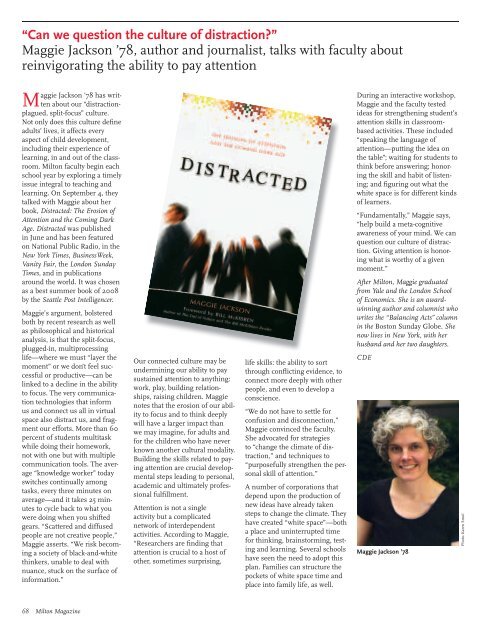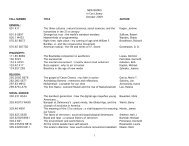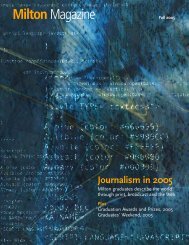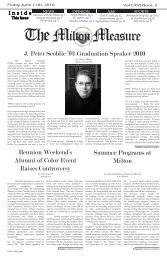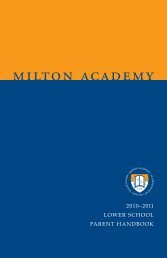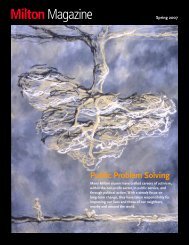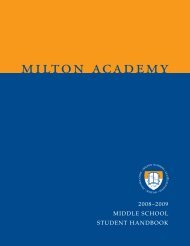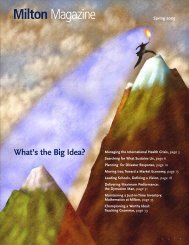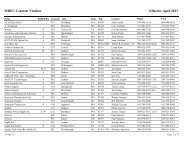“Can we question the culture of distraction?”Maggie Jackson ’78, author and journalist, talks with faculty aboutreinvigorating the ability to pay attentionMaggie Jackson ’78 has writtenabout our “distractionplagued,split-focus” culture.Not only does this culture defineadults’ lives, it affects everyaspect of child development,including their experience oflearning, in and out of the classroom.<strong>Milton</strong> faculty begin eachschool year by exploring a timelyissue integral to teaching andlearning. On September 4, theytalked with Maggie about herbook, Distracted: The Erosion ofAttention and the Coming DarkAge. Distracted was publishedin June and has been featuredon National Public Radio, in theNew York Times, BusinessWeek,Vanity Fair, the London SundayTimes, and in publicationsaround the world. It was chosenas a best summer book of 2008by the Seattle Post Intelligencer.Maggie’s argument, bolsteredboth by recent research as wellas philosophical and historicalanalysis, is that the split-focus,plugged-in, multiprocessinglife—where we must “layer themoment” or we don’t feel successfulor productive—can belinked to a decline in the abilityto focus. The very communicationtechnologies that informus and connect us all in virtualspace also distract us, and fragmentour efforts. More than 60percent of students multitaskwhile doing their homework,not with one but with multiplecommunication tools. The average“knowledge worker” todayswitches continually amongtasks, every three minutes onaverage—and it takes 25 minutesto cycle back to what youwere doing when you shiftedgears. “Scattered and diffusedpeople are not creative people,”Maggie asserts. “We risk becominga society of black-and-whitethinkers, unable to deal withnuance, stuck on the surface ofinformation.”Our connected culture may beundermining our ability to paysustained attention to anything:work, play, building relationships,raising children. Maggienotes that the erosion of our abilityto focus and to think deeplywill have a larger impact thanwe may imagine, for adults andfor the children who have neverknown another cultural modality.Building the skills related to payingattention are crucial developmentalsteps leading to personal,academic and ultimately professionalfulfillment.Attention is not a singleactivity but a complicatednetwork of interdependentactivities. According to Maggie,“Researchers are finding thatattention is crucial to a host ofother, sometimes surprising,life skills: the ability to sortthrough conflicting evidence, toconnect more deeply with otherpeople, and even to develop aconscience.“We do not have to settle forconfusion and disconnection,”Maggie convinced the faculty.She advocated for strategiesto “change the climate of distraction,”and techniques to“purposefully strengthen the personalskill of attention.”A number of corporations thatdepend upon the production ofnew ideas have already takensteps to change the climate. Theyhave created “white space”—botha place and uninterrupted timefor thinking, brainstorming, testingand learning. Several schoolshave seen the need to adopt thisplan. Families can structure thepockets of white space time andplace into family life, as well.During an interactive workshop,Maggie and the faculty testedideas for strengthening student’sattention skills in classroombasedactivities. These included“speaking the language ofattention—putting the idea onthe table”; waiting for students tothink before answering; honoringthe skill and habit of listening;and figuring out what thewhite space is for different kindsof learners.“Fundamentally,” Maggie says,“help build a meta-cognitiveawareness of your mind. We canquestion our culture of distraction.Giving attention is honoringwhat is worthy of a givenmoment.”After <strong>Milton</strong>, Maggie graduatedfrom Yale and the London Schoolof Economics. She is an awardwinningauthor and columnist whowrites the “Balancing Acts” columnin the Boston Sunday Globe. Shenow lives in New York, with herhusband and her two daughters.CDEMaggie Jackson ’78Photo: Karen Smul68 <strong>Milton</strong> <strong>Magazine</strong>
Alumni AuthorsRecently published worksBlack Sailor, White NavyJohn Sherwood ’85Black Power. White Racism.Confrontation. On our Navyships. “I want it now.” A senseof urgency. The demand to makethe promises of 1776 a reality forall Americans, especially blackAmericans. The energy of the1960s and the civil rights movement.All appear on the pagesof John Sherwood’s book BlackSailor, White Navy. SubstituteAdmiral Zumwalt for BobbyKennedy, Adolf Newmann forBull Conner, Craig Atkinson forStokely Carmichael, and youhave another chapter of blackAmericans’ push for equalityand freedom in the land of theDeclaration of Independence.However, instead of the streetsof Selma and the churches ofMontgomery, this struggle forhuman rights is played out onthe decks of the aircraft carrierKitty Hawk. A different gestureof respect, the Black Powersalute was repeatedly giventhere, challenging the traditional,Protestant, white naval culturethat had existed for decades.One of the most hierarchicalinstitutions in American life, theU.S. Navy had a history of elitismand paternalism. It was oneof the last places in Americanlife comfortable with the languageof democracy and sharedpower. Sherwood writes, “Thehistory of African Americans inthe U.S. Navy can be traced allthe way back to the nation’s colonialroots. Black seamen oftenserved on Royal Navy ships andprivateers well before the onsetof the war for Independence...But African Americans joinedthe fledgling American cause...Whatever the case, black sailorsfought not only in theContinental Navy but also in theeleven state navies and privateerforces...” (p. 1)Despite their contributions tothe cause of American independence,Negroes and Mulattoswere banned from the servicein 1798. I am reminded of thewriter James Baldwin’s insightthat history constantly moves usand ultimately sits there, staringat us in our present lives.Sherwood’s central argument inhis thoroughly researched bookreminds the reader of Baldwin’sview of history. He argues thatin 1972—almost 200 years aftertheir documented contributionsto American freedom—blacksailors were still struggling to berecognized as fully developed,thinking human beings.They could just as easily havequoted Thomas Paine as MartinLuther King when they werespeaking to their superior whiteofficers about the dignity andsacred essence of all mankind.Because using King’s approachwas often ignored, Sherwoodargues, they began to appeal tothe rhetoric of Malcolm X andimplement the tactics of StokelyCarmichael as they desperatelytried to be heard on several floatingships headed for Vietnam.Broken bottles replaced opendialogue, sharp knives from thekitchens trumped face-to-faceconversations between whiteand black colleagues as the civilrights movement was played outin the United States Navy.Sherwood does not end hisbook in despair. Thirty yearsafter the well-known and documentedincident on Kitty Hawk,Sherwood writes, “thanksto efforts begun by AdmiralZumwalt, institutional racismdoes not plague the service inthe same way it did in 1970.Minorities and women may stillhave a less favorable impressionof the service than maleCaucasians, but these groupsno longer feel that the systemis aligned against them. A 2005survey revealed that two-thirdsof officers and half of enlistedforces are personally committedto diversity or actively supportit. That is a ‘sea change’ of tremendousproportions from the1970s, when groups of whiteand black sailors squared offagainst one another to engage inviolence fueled by institutionalracism and a climate of fear anddespair.” (p. 269)Not a revolution, maybe, butenough change to make onebelieve that a few courageousmen, led by one AdmiralZumwalt, and many black sailors,with fewer titles and lessprivilege, were able to resist theforces of power and history tomake significant progress forfreedom. This book will havea central place in my AfricanAmerican history course thisfall, and I highly recommendit to anyone who wants toexpand their understanding andappreciation of the civil rightsmovement.Mark HilgendorfHistory DepartmentU.S. vs. Them: Howa Half Century ofConservatism HasUndermined America’sSecurityPeter Scoblic ’92The post-Iraq invasion debateson the war have made much ofthe neoconservative movementand its impact on the Bushadministration’s decision to goto war in Iraq and Afghanistan.In his new book, U.S. vs.Them: How a Half Century ofConservatism Has UnderminedAmerica’s Security, J. PeterScoblic, Class of 1992, dismissesthis assertion and makes thecase that George W. Bush is thedescendent of traditional ColdWar conservatism.Peter Scoblic starts by presentingthe reader with the “mystery”of the Bush administration post9/11, “[Why] was the administrationinclined toward unilateralism,militarism, and deceit? Thatwas the mystery—a mysterymade infinitely more puzzlingby the fact that, on more thanone occasion, the administrationbehaved in precisely theopposite fashion.” Peter definesconservatism in foreign policyas “a distinct attitude in whichthe world is conceived in termsof ‘us versus them’ or ‘good versusevil,’ with the United Statesassuming the role of ‘a righteousprotagonist facing a monolithicenemy.’”The first half of Peter’s bookoffers a very concise and detailedanalysis of the conservativemovement starting in the 1950sand culminating in RonaldReagan’s election in 1980, whichthe author argues, is actually theculmination of the 1964 BarryGoldwater election. Peter framespart one of the book with thecareer of William F. Buckley, Jr.and his National Review maga-<strong>Milton</strong> <strong>Magazine</strong> 69


